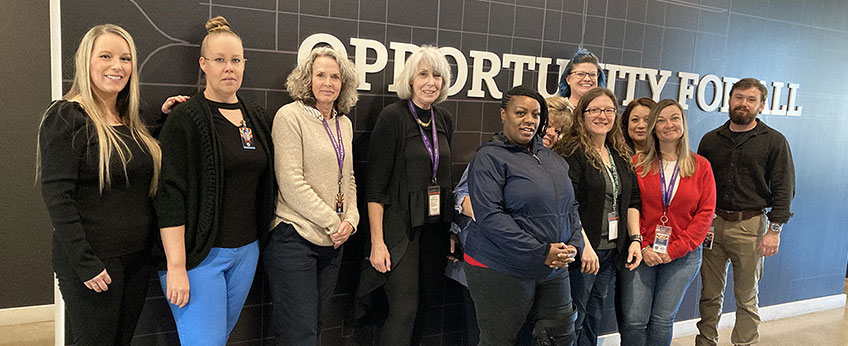Adult Protective Services Care Coordination Team Helps Vulnerable Adults Overcome Barriers to Stability and Security

Stage 4 cancer and mobility issues made life difficult for a 71-year-old Arizona veteran. Because his condition wasn’t service-related, he was only eligible for partial support from the U.S. Department of Veterans Affairs (VA). Thankfully, the newly-formed Adult Protective Services (APS) Multi-Disciplinary Team (MDT) was prepared with community resources to drastically improve this veteran’s circumstances by the very next day.
The APS investigator who first visited the client realized that a wheelchair would be beneficial to his mental health and self-sufficiency, so the investigator made a phone call to the MDT.
The MDT received information about local resources that could help provide a wheelchair, and within eight minutes of making contact, the care coordinator on the MDT team placed a call to the Gospel Rescue Mission, which agreed to provide the wheelchair.
The order was placed and the following day, a brand-new wheelchair was received with a gel seat pad to conform to the body and prevent skin from breaking down. The client was moved to tears with gratitude for the help and support of APS. He is now able to board the bus, retrieve his mail, and attend his medical appointments with greater ease and convenience.
This case is just one example of how the MDT, and the Care Coordination Team within, assist APS investigators out in the field. With this support, investigators do not need to rely solely upon their own knowledge of an area to identify which resources are available to clients. “We want to take some of that burden from the investigators,” said Rusty Brown, APS Manager of Field Support, who oversees the MDT. “They are incredibly stretched for time, so we want to be able to provide those resources.”
After identifying the gap in services for clients and hearing the investigators need help finding resources for clients, APS established the new MDT team this fiscal year and created a new Care Coordinator position to help expand access to resources related to complex situations involving biohazards, hoarding, and pest remediation. Those resources, in particular, are scarce everywhere, but especially in rural areas. In Maricopa County and Pima County, the team also leverages a partnership with AAA Region One and Pima Council on Aging (PCOA) to help provide more intensive case management to self-neglecting clients.
To identify potential gaps in services, the Team has been working on a new centralized dashboard to help newer investigators, as well as more experienced investigators. Approximately 800 resources across 66 categories have been identified thus far, from in-home care and fiduciary services, to home-delivered meal services.
APS’ Care Coordinator, Elizabeth Morton, joined the team in August and works with clients, APS investigators, and vendors to help orchestrate a comprehensive response to often dire circumstances. "The condition of their living environment is not an environment that you or I, or anyone else, would want to live in,” said Elizabeth. If unaddressed, these issues can cause health concerns from rodent or roach waste that can carry disease. Hoarding can also cause unsafe and unsanitary home conditions.
Approximately 15 clients have received assistance thus far with the help of the Care Coordination Team. In some cases, prior to the assistance, clients were unable to access crucial parts of their homes, such as their kitchen or bathroom, nor prepare food or take care of their needs in the restroom. In one case, a client who was visually impaired had to climb over piles of possessions in her home. APS hired companies to clear pathways and remove tripping and falling hazards so the client could safely move throughout her home without injuring herself. In another case, approximately 30 bags of trash were cleared from a client’s home. In cases of self-neglect, the ultimate goal is for clients to be able to remain safely in their homes.
APS is thorough with its approach, and before committing the resources, makes sure the client is willing and ready to participate, and that there’s a long-term plan to solve the problem. They know that with hoarding, if the client is not ready, the home will return to its current state. Working proactively, they create a plan for support to prevent future problems, such as arranging for housekeeping or scheduling a home-based care service to keep conditions from becoming unsanitary again.
While APS is best known for its role in investigating cases of abuse, neglect and exploitation perpetrated by another person, self-neglect cases can also be as devastating to the health and well-being of a vulnerable adult. Over the next half of the fiscal year, APS is also integrating existing APS functions into the MDT such as medical consultations, substantiations, and additional supports to assist investigators and clients in a coordinated and collaborative manner. Thanks to the MDT and Care Coordination Team, having resources and community support readily available makes a significant difference in APS’s ability to comprehensively respond to situations such as these.
If you suspect a vulnerable adult is experiencing neglect, including self-neglect, please file a report with Adult Protective Services. You can file a report online 24 hours a day, seven days a week, or by calling 1-877-SOS-ADULT (1-877-767-2385) Monday - Friday, 7:00 a.m. - 7:00 p.m.; Saturday, Sunday and state holidays, 10:00 a.m. - 6:00 p.m.

